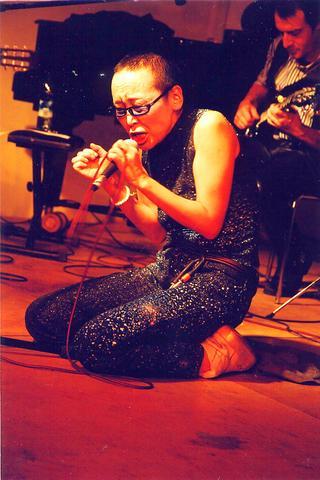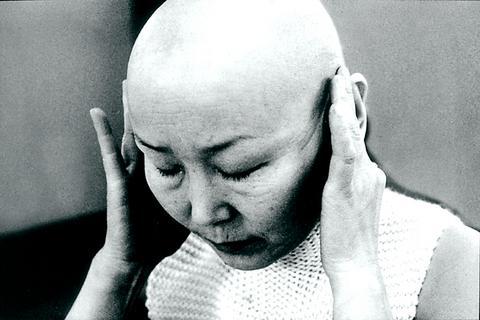Sometimes, Sainkho Namtchylak sounds like an opera tenor, with a clear and bright voice. At other times, her voice is like the singing of birds, or the prattle of a baby. Then she can chat like the crying of a crow, letting out exotic and intense feelings. That kind of variety in her vocals has earned her comparisons to artists such as Bjork, Zap Mama, Patti Smith, Nina Hagen or Maja Ratkje.
Yet her unique throat-singing technique and her experimental spirit, combining various music genres, has made her stand out as one of the few artists influential in both world music and electronic music.

Namtchylak hails from Tuva and comes this week to Taipei for two concerts -- one at the Zhongshan Hall and another at Corridor Cafe in the NTU Gymnasium -- and one music workshop, starting tomorrow.

PHOTO COURTESY OF THE ARTIST
For Taipei audiences, her show will be a rare chance to enjoy music while imagining the broad coniferous woods, the grasslands and the deserts of Tuva without flying all the way to the remote country located at the border of Siberia and Mongolia.
"For me, music has no boundaries. Especially for a time like now, it becomes more possible for us to let music dialogue with each other, crossing the realm of time, space and cultures," Namtchylak said in an interview from China.
Born in the Republic of Tuva in a family of nomadic ancestry, Namtchylak grew up singing and later studied vocals in Moscow. Apart from classical training, she also learned traditional Tuvan throat-singing (khoomei) and Tibetan Buddhist singing. In 1989, she first crossed into the European avant-garde improvisatory music scene, dedicating herself to expanding the potential of throat-singing in combination with various musical styles. The same year she worked and toured with former Soviet Union avant-garde jazz band Tri-O.
Since then, she's spent the past 15 years traveling around the globe spreading her unique sound that combines Tuvan throat-singing with various vocal techniques under the broad framework of jazz, improvisation, experimental and electronic music.
Namtchylak, who has 30 albums to her name, has worked with many outstanding musicians such as Peter Kowald, Ned Rothernberg, Evan Parker, William Parker, Hamid Drake, Djivan Gasparian, Otomo Yoshihide and Hakutobo.
Being one of the pioneers bringing Tuvan music to the Western world, Namtchylak is ironically not embraced by all her Tuvan countrymen.
Throat-singing is a special technique in which two notes are sung at the same time. There is a very strict gender taboo on throat singing in Tuva, restricting it traditionally to men only. In Tuva, Mongolia and Central Asian countries, it is believed that throat-singing leads to sterility in women.
Namchylak not only broke the tradition of "no throat-singing for women," but also having spent two decades living in the West, she is viewed at home as somewhat of a traitor of her country's traditional values.
In 1997, a few days before her 40th birthday, Namtchylak was physically assaulted and hospitalized in Moscow by a group of people claiming to be Tuvans.
The 2001 album Time Out was released after her rehabilitation from the assault. She wrote in the CD that the album is dedicated to Tuva and its people.
"I hope one day my fellow countrymen can understand, that I am an artist belonging to the whole world. The music I create has no boundaries," she said.
In a way, the allure of Namtchylak's music does not lie in her vocal virtuosity but her remaining true to the spirit of experimentation and breaking boundaries. For her two Taipei concerts, audiences will be able to appreciate just such a spirit. She is expected to perform tunes from her two well-received albums, Stepmother City (2000) and Who Stole the Sky (2003).
Performance Notes:
What: Sainkho Namtchylak
When: Tomorrow 7:30pm
Where: Zhongshan Hall, Taipei, 98, Yanping S Rd (
Tickets: NT$800 (available at Arts Ticketing outlets)
When: Sunday, 8:30pm
Where: Corridor Cafe of NTU Sports Center
Tickets: NT$500 (at the door from 8:00pm includes one drink)
Sainkho Namtchylak Masterclass:
When: Sunday, 2pm to 4pm at T305 Experimental Theater, Department of Theater, Taipei National Arts University, 1, Xueyuan Rd, Beitou, Taipei (

May 18 to May 24 Pastor Yang Hsu’s (楊煦) congregation was shocked upon seeing the land he chose to build his orphanage. It was surrounded by mountains on three sides, and the only way to access it was to cross a river by foot. The soil was poor due to runoff, and large rocks strewn across the plot prevented much from growing. In addition, there was no running water or electricity. But it was all Yang could afford. He and his Indigenous Atayal wife Lin Feng-ying (林鳳英) had already been caring for 24 orphans in their home, and they were in

On May 2, Chinese Nationalist Party (KMT) Chairman Eric Chu (朱立倫), at a meeting in support of Taipei city councilors at party headquarters, compared President William Lai (賴清德) to Hitler. Chu claimed that unlike any other democracy worldwide in history, no other leader was rooting out opposing parties like Lai and the Democratic Progressive Party (DPP). That his statements are wildly inaccurate was not the point. It was a rallying cry, not a history lesson. This was intentional to provoke the international diplomatic community into a response, which was promptly provided. Both the German and Israeli offices issued statements on Facebook

Even by the standards of Ukraine’s International Legion, which comprises volunteers from over 55 countries, Han has an unusual backstory. Born in Taichung, he grew up in Costa Rica — then one of Taiwan’s diplomatic allies — where a relative worked for the embassy. After attending an American international high school in San Jose, Costa Rica’s capital, Han — who prefers to use only his given name for OPSEC (operations security) reasons — moved to the US in his teens. He attended Penn State University before returning to Taiwan to work in the semiconductor industry in Kaohsiung, where he

President William Lai (賴清德) yesterday delivered an address marking the first anniversary of his presidency. In the speech, Lai affirmed Taiwan’s global role in technology, trade and security. He announced economic and national security initiatives, and emphasized democratic values and cross-party cooperation. The following is the full text of his speech: Yesterday, outside of Beida Elementary School in New Taipei City’s Sanxia District (三峽), there was a major traffic accident that, sadly, claimed several lives and resulted in multiple injuries. The Executive Yuan immediately formed a task force, and last night I personally visited the victims in hospital. Central government agencies and the